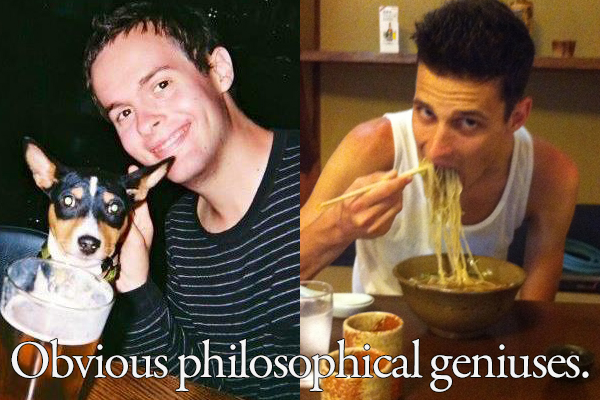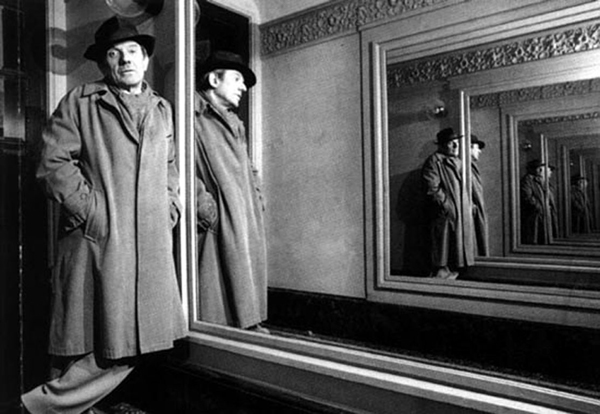We Got Sick of Theory and Talked About That

Between July 9th and August 5th , Alec Niedenthal and I had a long & blabby conversation that began when Alec enthusiastically responded to me saying “I’m almost completely gagged now by fucks like Deleuze.” Knowing Alec mostly as a fellow young philosophy & theory head, I asked after his newfound disillusionment with the stuff.
That conversation posted here—mostly unedited—in hopes you find it useful or rousing.
Ken: What literature strikes you as bullshit now?
Alec: Your question is great, but I’m not sure that I’m equipped to answer it. I’ll explain why. First, I’m not sure how possible it is today to talk about what sort of art is valueless, ie bullshit, when the role of art is so unclear and, less evidently but no less significantly, when we as avant-garde writers are unsure whether there should be an institution called “Art” any longer. That’s to say, it’s hard to even talk about what literature should be doing when the “should”-level claim about literature in general—basically, what it ought to depict and how to depict it—is supposed to be. READ MORE >
The Beginner’s Guide to Hegel

Jesse Hudson, one of the most monastic and scholarly people I know, started talking about Hegel on Facebook. Hegel’s work has always felt intimidating to me, and often when I read his writing, I think that he’s totally full of shit—that he took simple, intuitive ideas and hyperinflated their elucidation to appear logically rigorous and philosophically masterful. Basically, I got thinking that Hegel was a damned charlatan.
But I also knew that Jesse deeply responded to Hegel’s philosophy. So I asked him some questions for the Hegel-averse and uninitiated, following the format of The Beginner’s Guide to Deleuze with Christopher Higgs. Here we go:
Why should we read Hegel?
Hegel is fucking difficult, right?
In order to proclaim the importance of reading Hegel, the initial hurdle to overcome is the impression one initially has in regards to the supposed difficulty (or, stated more extremely, incomprehensibility) of Hegel’s texts. This isn’t necessarily a misinformed opinion of Hegel since, without doubt, Hegel’s texts are extraordinarily rigorous and densely packed. It isn’t uncommon to spend hours (or hours and hours over the span of several days) unpacking a mere page or two of his Phenomenology or Logic. This is due, in large part, to the fact that Hegel (like, it must be admitted, any other philosopher) writes with his own peculiar terminology. Derrida has differance; Deleuze has rhizome; Hegel has being-for-self, negation of the negation, positing presuppositions, ‘sublation’, being-in-and-for-self, etc. Hence, reading Hegel involves a great deal of work that is not unlike the work involved in learning a new language. But, to paraphrase Derrida, you wouldn’t necessarily decry the difficulty of a thermonuclear physics text or a text discussing the subtleties of semiotics and differential calculus. Therefore, the cries of anger and frustration seem a bit odd when directed towards philosophy (texts that are undoubtedly as theoretical and ‘specialized’ as the previous examples). READ MORE >
Favorite Passages from Deleuze & Guattari’s What Is Philosophy? (In Chronological Order)
To criticize is only to establish that a concept vanishes when it is thrust into a new milieu, losing some of its components, or acquiring others that transform it. But those who criticize without creating, those who are content to defend the vanished concept without being able to give it the forces it needs to return to life, are the plague of philosophy.
There is such force in those unhinged works of Hölderlin, Kleist, Rimbaud, Mallarmé, Kafka, Michaux, Pessoa, Artaud, and many English and American novelists, from Melville to Lawrence or Miller, in which the reader discovers admiringly that they have written the novel of Spinozism. To be sure, they do not produce a syntheses of art and philosophy. They branch out and do not stop branching out. They are hybrid geniuses who neither erase nor cover over differences in kind, but, on the contrary, use all the resources of their “athleticism” to install themselves within this very difference, like acrobats torn apart in a perpetual show of strength.
If philosophy is paradoxical by nature, this is not because it sides with the least plausible opinion or because it maintains contradictory opinions but rather because it uses sentences of a standard language to express something that does not belong to the order of opinion or even of the proposition.
Philosophy thus lives in a permanent crisis. The plane takes effect through shocks, concepts proceed in bursts, and personae by spasms.
We do not lack communcation. On the contrary, we have too much of it. We lack creation. We lack resistance to the present. READ MORE >
The Beginner’s Guide to Deleuze

Over lunch, Christopher Higgs and I talked about Gilles Deleuze. I was saying how a lot of my friends–Chris, Blake Butler, and Derek White, to name a few–are really into his writing, especially the ginormous book A Thousand Pleateaus, co-written with Felix Guattari. I’ve tried to read it and get into it a few times, and kept putting the book up, scared off by not being able to immediately comprehend the text, not being able to decipher the numerous codes, terms, coinages. Recently, I changed. I picked up A Thousand Pleateaus again and flipped to a random chapter and read. I enjoyed it, and am enjoying it. Like my experience with Finnegans Wake, there are lucid swathes that I feel I understand, and then there are times when it’s packed dense or just orgiastically conceptual and I tune out a bit. But that process of coming in and out of lucidity is nice. Sort of trancelike.
I mentioned asking Chris some questions about Deleuze, his thinking, the books. I’m sort of acquainted with his ideas through the book A Thousand Years of Nonlinear History (amazing book!), and what Deleuze I’ve now read. But, let me ask you/Chris some maybe dumb questions.
Firstly: Why should we read Deleuze?
Deleuze is the future. He is almost the now, but not yet. Just out of reach, just over the horizon, he is akin to the force that makes the sky pink after the sun sets and pink again right before the sun rises. He is both pre and post everything, like the feeling before a meal of being famished followed by the feeling after the meal of being stuffed. He does what no other thinker before him could do: he upends Plato, he quiets Hegel, he puts all the little thinkers to bed. READ MORE >
Insightful read of Wallace’s philosophical concerns, passions. James Ryerson: Thank you.
“…philosophy is music, music is philosophy, and the other way round.” – Thomas Bernhard
httpv://www.youtube.com/watch?v=pbPUkLrmzUA
Abner Jay reinverts the age-old ‘looking for a virgin’ myth in “Don’t Mess With Me Baby.”
httpv://www.youtube.com/watch?v=vpjy0MOMn3Y
Anthony Braxton called Abner Jay an American master.
December 11th, 2010 / 3:01 am
Mess Section, anti-fragile edition
Nassim Taleb has posted a table illustrating his concepts of fragility, robustness & anti-fragility. Context: “This seems quite a universal traits of languages (I tried Mediterranean, classical, and Semitic languages),where the notion of antifragility is totally absent.” :: Noah Cicero gives a short history of philosophy. :: Jonathon Keats tries to make porn for God. :: Sententia #3 wants novel pitches/excerpts. :: gifs get subtle. :: “I often heard [D.W. Griffith] say that he would rather have written one page of Leaves of Grass than to have made all the movies for which he received world acclaim.”
